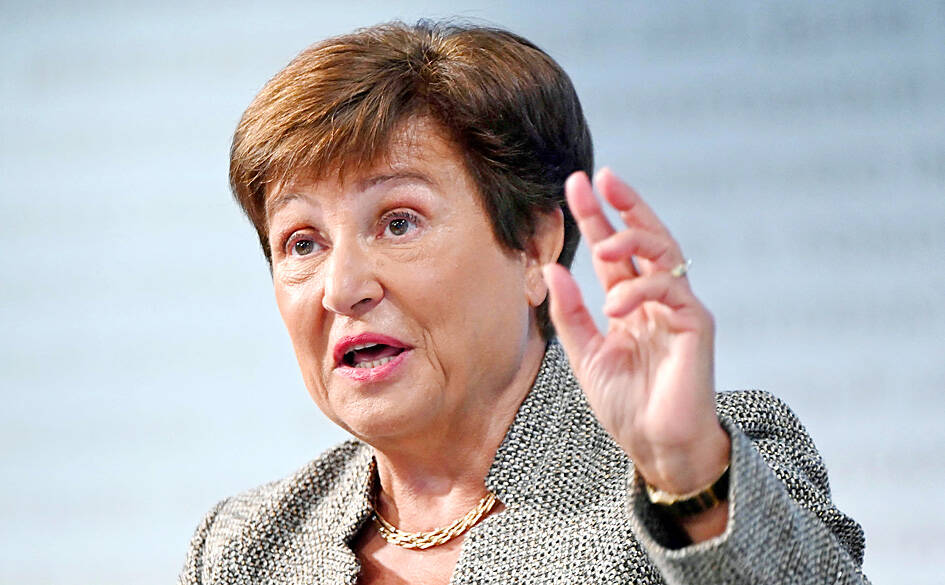Artificial intelligence (AI) poses risks to job security around the world, but also offers a “tremendous opportunity” to boost flagging productivity levels and fuel global growth, IMF managing director Kristalina Georgiev said in an interview with Agence France-Presse
AI will affect 60 percent of jobs in advanced economies, Georgieva said in Washington, shortly before departing for the annual World Economic Forum in Davos, Switzerland.
With AI expected to have less effect in developing countries, about “40 percent of jobs globally are likely to be impacted,” she said, citing a new IMF report.

Photo: AFP
“And the more you have higher skilled jobs, the higher the impact,” she added.
However, the IMF report published on Sunday evening notes that only half of the jobs impacted by AI would be negatively affected; the rest might actually benefit from enhanced productivity gains due to AI.
“Your job may disappear altogether — not good — or artificial intelligence may enhance your job, so you actually will be more productive and your income level may go up,” Georgieva said.
The IMF report predicted that, while labor markets in emerging markets and developing economies would see a smaller initial impact from AI, they are also less likely to benefit from the enhanced productivity that would arise through its integration in the workplace.
“We must focus on helping low income countries in particular to move faster to be able to catch the opportunities that artificial intelligence will present,” Georgieva said.
“So artificial intelligence, yes, a little scary. But it is also a tremendous opportunity for everyone,” she said.
The IMF is due to publish updated economic forecasts later this month, which would show the global economy is broadly on track to meet its previous forecasts, she said.
It is “poised for a soft landing,” Georgieva said, adding that “monetary policy is doing a good job, inflation is going down, but the job is not quite done.”
“So we are in this trickiest place of not easing too fast or too slow,” she said.
This year is likely to be “a very tough year” for fiscal policy worldwide, as countries look to tackle debt burdens accumulated during the COVID-19 pandemic and rebuild depleted buffers, Georgieva said.
Billions of people are also due to go to the polls this year, putting additional pressure on governments to either raise spending or cut taxes to win popular support.
“About 80 countries are going to have elections, and we know what happens with pressure on spending during election cycles,” she said.
The concern at the IMF is that governments around the world spend big this year and undermine the hard-won progress they have made in the fight against high inflation, she said.
“If monetary policy tightens and fiscal policy expands, going against the objective of bringing inflation down, we might be for a longer ride,” she said.

The US dollar was trading at NT$29.7 at 10am today on the Taipei Foreign Exchange, as the New Taiwan dollar gained NT$1.364 from the previous close last week. The NT dollar continued to rise today, after surging 3.07 percent on Friday. After opening at NT$30.91, the NT dollar gained more than NT$1 in just 15 minutes, briefly passing the NT$30 mark. Before the US Department of the Treasury's semi-annual currency report came out, expectations that the NT dollar would keep rising were already building. The NT dollar on Friday closed at NT$31.064, up by NT$0.953 — a 3.07 percent single-day gain. Today,

‘SHORT TERM’: The local currency would likely remain strong in the near term, driven by anticipated US trade pressure, capital inflows and expectations of a US Fed rate cut The US dollar is expected to fall below NT$30 in the near term, as traders anticipate increased pressure from Washington for Taiwan to allow the New Taiwan dollar to appreciate, Cathay United Bank (國泰世華銀行) chief economist Lin Chi-chao (林啟超) said. Following a sharp drop in the greenback against the NT dollar on Friday, Lin told the Central News Agency that the local currency is likely to remain strong in the short term, driven in part by market psychology surrounding anticipated US policy pressure. On Friday, the US dollar fell NT$0.953, or 3.07 percent, closing at NT$31.064 — its lowest level since Jan.

The New Taiwan dollar and Taiwanese stocks surged on signs that trade tensions between the world’s top two economies might start easing and as US tech earnings boosted the outlook of the nation’s semiconductor exports. The NT dollar strengthened as much as 3.8 percent versus the US dollar to 30.815, the biggest intraday gain since January 2011, closing at NT$31.064. The benchmark TAIEX jumped 2.73 percent to outperform the region’s equity gauges. Outlook for global trade improved after China said it is assessing possible trade talks with the US, providing a boost for the nation’s currency and shares. As the NT dollar

The Financial Supervisory Commission (FSC) yesterday met with some of the nation’s largest insurance companies as a skyrocketing New Taiwan dollar piles pressure on their hundreds of billions of dollars in US bond investments. The commission has asked some life insurance firms, among the biggest Asian holders of US debt, to discuss how the rapidly strengthening NT dollar has impacted their operations, people familiar with the matter said. The meeting took place as the NT dollar jumped as much as 5 percent yesterday, its biggest intraday gain in more than three decades. The local currency surged as exporters rushed to